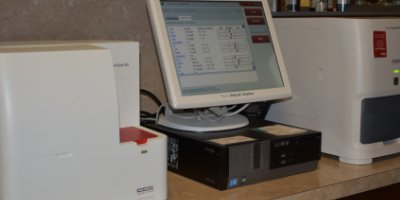It was a typical day during Dental Awareness Month at Bingle Vet, when a client called Mrs. Jones bought Angel in for her annual dental cleaning. Angel is a beautiful, spunky, white, five-year-old toy poodle, who knows and is loved by everyone in the clinic. On this day, like every time she visits, Angel bounced through the clinic, head high, little pompom tail wiggling as fast as it could from side to side, a picture of perfect health.
Prior to dental cleaning, we always recommend blood work to assure that the pet is healthy enough to withstand sedation. Our typical day turned gray when we completed Angel’s blood test and learned that she had an acute liver problem. If we had sedated her, she might have had complications.
Even if she had survived sedation and dental cleaning, however, Angel’s liver problem would have gone undetected, likely until the disease had progressed too far to save her. As I said, she was the picture of health. With the blood test, we were able to prescribe the proper medication. After four weeks we tested her blood again, and she was able to have her teeth cleaned. More importantly, her liver problem was caught early.
The facts are clear. Approximately 20% of all senior dogs that appear healthy during a physical examination actually have an underlying, undetectable disease. Undetectable, that is, without a blood test. Blood work identifies a variety of health problems, including diabetes, kidney disease, liver disease, infection, anemia, Addison’s disease, and malnutrition. If these conditions are caught early, they can be treated before further complications set in. Once a pet starts showing signs of sickness or symptoms of disease, the condition is often so far advanced that it is difficult and costly to treat.
As Angel’s case illustrates, annual blood work should be considered an important part of any pet’s wellness program. I can perform physicals all day long, examining everything from your pet’s nose to the tip of its tail, but without blood work, there is no way for me to know what is going on internally. While physically, a pet may look and act healthy, the question begs, “What is going on inside?” The only way to know that is to “look” inside.
Blood work is an early detection tool that will help extend your pet’s life. It is a window into the body.
– Dr. Robert Vaughan, II



